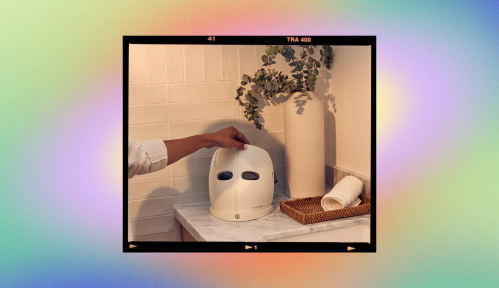Our editors independently select these products. Making a purchase through our links may earn Well+Good a commission
There’s a Right and a Wrong Way To Wash Your Armpits, and It Can Make All the Difference in How Much You Stink
How to remove smell from underarms with natural solutions: Learn about hygiene, deodorants, and diet tips to keep underarm odor at bay.

We can always count on hot, sticky summers to get our sweat glands working overtime, inevitably leaving us with the kind of stench that brings back memories of middle school gym class. And while deodorant and a regular soap-and-water cleanse may be enough for some people to stay stink-free, those with particularly smelly armpits may need a little something extra.
Experts in This Article
dermatologist and founder of Surface Deep
director of cosmetic and clinical research in dermatology and associate professor of dermatology at Mount Sinai Hospital
board-certified dermatologist in Pittsburgh
founder of Kaia Naturals
“If you know someone who’s complaining that they smell two hours after getting out of the shower, it’s not because they’re unhygienic,” says Mary Futher, TikTok’s @MadameSweat and the founder of Kaia Naturals in a video, “it’s because they don’t know the little tricks to help this problem.”
If you’re one of those people who’s wondering how to remove smell from underarms, we’ve got you covered.
What causes smelly armpits?
We’ve all had those days when our armpits smell like onions (… just me?), but what you may not realize is that sweat, on its own, is odorless. Things start to stink when sweat interacts with the bacteria on your skin, which can really build up when it’s trapped within clogged pores, explains Joshua Zeichner, MD, a board-certified dermatologist in New York City.
“The bacteria under the arms known as corynebacterium break down sweat and contribute to the development of body odor,” he says. “Over time, sweat, dirt, oil, and antiperspirants can build up in the underarm area. In some cases, this may lead to irritation, inflammation, and disruption of the skin barrier. Some feel it also may alter the microbiome of the skin under the arms, which can become disrupted when the skin barrier becomes inflamed, leading to overgrowth of specific forms of bacteria.”
Why is deodorant alone not helping?
For many people, a regular cleanser should do the trick against fending off smelly sweat—as long as you’re taking extra care to scrub the area under your arms and applying a deodorant or antiperspirant before you head out for the day. But if you’ve got a lot of bacteria-filled debris hanging around and clogging your pores then deodorant (which is basically armpit perfume) and antiperspirant (which blocks sweat glands to cut down on sweat) isn’t enough.
How to prevent smelly armpits
1. Change your daily hygiene routine
Unsurprisingly, keeping your pits fresh starts with a solid set of hygiene practices. For starters, you’ll want to be sure you’re washing them properly in the shower—and we’ll get into exactly how to do that below.
In addition to a good lather and rinse, giving your underarms some additional care on the antibacterial front can also help, so it may be worth investing in a glycolic acid treatment that will work to kill of the dirt and bacteria that makes you stink.
One other cool thing to keep in mind: Properly prepping your pits will help your deodorant work even better. “Deodorants coat the underarm skin, layering a film on the armpit, and the residue stays on even after normal bathing,” says Alicia Zalka, MD, board-certified dermatologist and founder of Surface Deep Anti-Odorant. That residue can trap bacteria, and make it seem that your go-to D.O. has suddenly stopped working. By practicing proper underarm hygiene, you’ll create a clean canvas for those sweat-stopping products to reach their full potential.
2. Make dietary changes
While the phrase “you are what you eat” has largely (thankfully) become outdated, it still rings true in terms of body odor. “While some healthy foods can cause body odors—such as garlic, onion, cruciferous veggies—a diet high in processed foods can have a much more dramatic effect on your scent,” Parsley Health nutritionist Adrienne Dowd, RD, previously told Well+Good. “Processed foods are high in chemicals your body must process and excrete.”
Some of the worst offenders, according to dietitians? Allium vegetables (AKA those that literally smell like BO, like onions, scallions, leeks, and garlic), red meat, strong spices (like cumin, cayenne, and horse radish), asparagus, and cruciferous vegetables (like broccoli and cauliflower). To combat the not-so-sweet effect that food can have on your stench, try filling your diet with plant-based foods and good-quality proteins, and do your best to limit the processed stuff you’re eating.
3. Tweak your lifestyle
Toxins in your body are primarily eliminated through sweat, which is why—to put it bluntly—you may find that you reek the morning after a big night out.
“The body identifies alcohol as a toxin, so as the alcohol breaks down in the body, it turns into acetic acid. What the body can’t metabolize is excreted in other pathways through a process called oxidation,” says Jenny Beth Kroplin, RD. “The oxidation process breaks the toxins down into diacetic acid, carbon dioxide, and water which is eliminated through sweat, urine, and, breathe.”
In addition to abstaining from booze, drinking tons of water and engaging in drip-inducing activities—like saunas and exercise—can help you sweat out some of the smelly stuff.
According to The Cleveland Clinic, there are a few other lifestyle tweaks that can also help prevent you from stinking, including keeping your armpit hair shaved (or trimmed) so that it can’t trap as much bacteria, and—more importantly—reducing stress levels. “Sweat produced when you are stressed, anxious, or scared has a different scent than when you are happy,” says Dowd. “And you guessed it, it smells worse.”
4. Try natural remedies
“Armpit detoxes” have been buzzing around the Internet over the last few years, and while you don’t necessarily *need* one, they can potentially be effective in getting rid of body odor.
“If you do a detox on your armpits, then you’ll have less sweat, and the sweat won’t smell as bad because the bacteria won’t grow,” says Debbi Burnes, natural beauty expert and founder of Sumbody Skincare. “The bacterial growth is what causes the smell, and that happens when your pores are clogged—perspiration itself actually has no odor.”
Apple cider vinegar is a dermatologist-favorite natural remedy thanks to its antibacterial and anti-fungal properties, and there are a few ways you can work it into your routine.
How to detox your armpits
- 1.ACV and baking soda: One of the ways you can drum up your ACV armpit detox involves another hack-worthy ingredient, baking soda. “You can use apple cider vinegar, water, and baking soda,” says Burnes.
- 2.ACV and charcoal: To soak up even more of the gunk in your armpit pores, Burnes says you can use the three ingredients above with some charcoal. “Just make sure to not use full-strength apple cider vinegar for these—always dilute with water,” she says. “The key is to do three parts water to every one part ACV.”
- 3.ACV and clay: If you use ACV and Bentonite clay, you can create a paste to wipe onto your armpits for about 20 minutes for two days straight, then you’re good to go.
How to remove underarm smell at home by effectively washing your armpits
If you’ve found yourself wondering, “why do armpits smell even after washing,” it could be because you aren’t doing the job exactly right. To eliminate armpit smell before you even step out of the shower, follow these proper washing practices.
1. Get a good antibacterial soap
Because armpit odor occurs when sweat and bacteria interact, the key to eliminating it is, simply, to tackle the bacteria—which means using some sort of antibacterial agent under your arms.
“If you’re using tutti frutti [soaps], they’re not gonna help with somebody who’s got a lot of body odor you need something a little stronger,” says Futher. “I make a soap with salt and apple cider vinegar you don’t have to use this one but look for something that’s antibacterial.”
“Antibacterial” sounds like a scary word, but it’s not. Antibacterial body washes aren’t using the same strengths of ingredients that you find in antibacterial dish soap, for example. These formulas include ingredients like charcoal, rosehip oil, and grapefruit extract that gently remove odor-causing bacteria. Plus, they’re paired with gentle surfactants and moisturizing ingredients so your skin is left clean, not stripped.
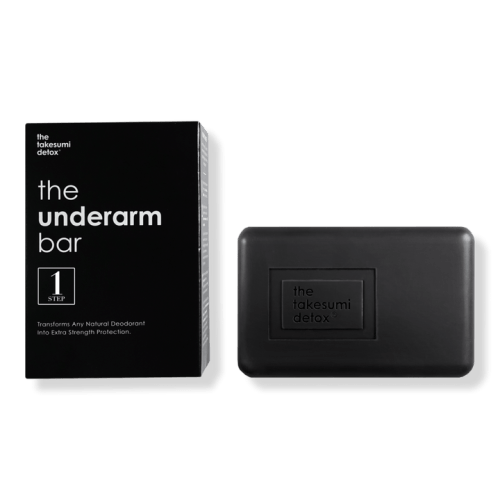
Kaia Naturals, The Takesumi Detox The Underarm Bar — $25.00
This antibacterial charcoal bar soap, which was created by Futher, uses apple cider vinegar, activated charcoal, and sea salt to keep stench at bay and help your deodorant of choice give you extra-strength protection.
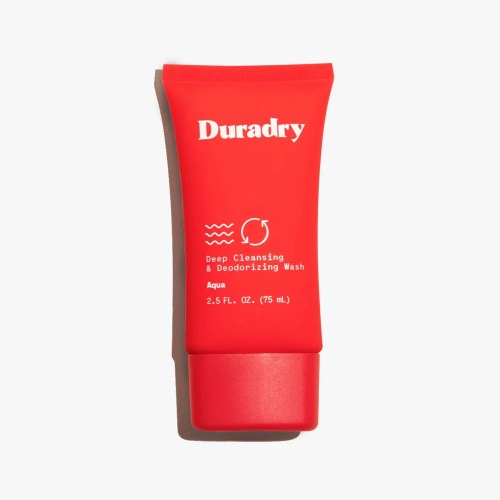
Duradry, Wash — $10.00
This under-arm cleanser pairs gentle, foaming surfactants with grapefruit and bergamot, two ingredients with antibacterial properties, to thoroughly wash away odor-causing bacteria. Plus, it includes skin-loving ingredients like vitamin B5, avocado oil, green tea extract, olive oil leaf extract, and aloe juice to soothe and condition the skin.
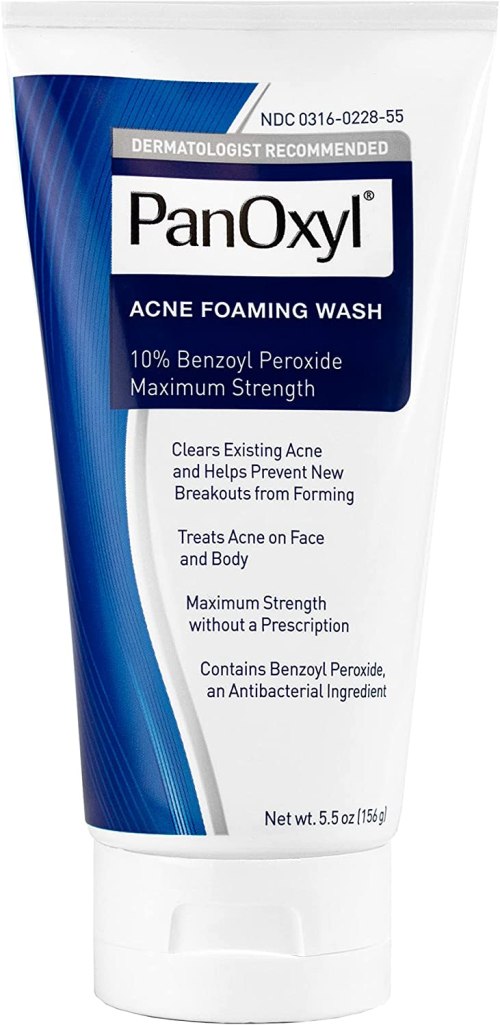
PanOxyl, Acne Foaming Wash Benzoyl Peroxide 10% Maximum Strength Antimicrobial — $10.00
If your pits aren’t so sensitive, Lindsey Zubritsky, MD, a board-certified dermatologist in O’Hara Township, Pennsylvania, recommends this personal-hygiene hack—wash your underarms with this benzoyl peroxide face wash. The antimicrobial ingredient will help get rid of that stench.
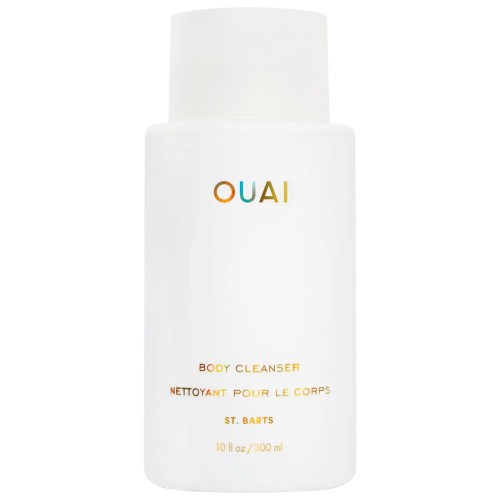
Ouai, St. Barts Body Cleanser — $28.00
Rosehip oil is the star of this body wash from Ouai. It has anti-microbial properties that make it great for rinsing away the bacteria that make us stink. It also has moisturizing jojoba oil and glycerin to leave your skin soft and smooth. Bonus: The dreamy St. Barts scent will make your shower smell like a vacation every time.
2. Lather that soap on for 30 seconds
If you aren’t properly cleaning your pits when you shower, you may not be fully whisking away all of that odor-causing bacteria. Futher says this could explain why you still smell less-than-fresh even after your standard lather-and-rinse. You may also leave behind deodorant residue and other impurities that trap sweat and further contribute to the stink.
Futher suggests applying soap to each armpit for at least 30 seconds to ensure it’s truly eliminating any odor-causing bacteria. For those with underarm hair, be sure to really work the product into the skin to ensure it’s penetrating properly, as hair is particularly prone to trapping bacteria. In addition to helping with stench, a thorough cleanse can also help treat and prevent armpit pimples and itchy armpits.
By regularly washing pits with an antibacterial and allowing the formula to sit for at least 30 seconds, you can give your hardworking deodorant a helping hand, ultimately leading to longer hours of odor-free assurance. You’d never wash your hands for two seconds and expect them to be squeaky clean, so why should washing your pits be any different?
3. Reset pit pH with an AHA-infused treatment
Think of this as the toning step of your armpit-cleanse routine—once your pits are clean and dry, it’s time to apply a pit-specific alpha-hydroxy acid (AHA), like glycolic acid, to lower the skin’s pH, explains Alicia Zalka, MD, board-certified dermatologist and founder and CEO of Surface Deep. That’s because bacteria thrive in basic (aka high pH) environments, and soap is alkaline, which can make your pits more basic. Glycolic makes the pits more acidic, which is less hospitable for bacteria.
“The glycolic [acid] is acidifying the skin and keeping the pores unplugged, taking care of some of the oils, which when paired with a high pH can lead to odor,” says Dr. Zalka. “If you’re taking some of the oils away, the sebum, and if you’re taking the plugged pores away, and you’re acidifying the skin, awesome. No odor.”
AHA solutions designed for the face are likely too harsh for the delicate underarm area, so using an AHA-infused deodorant will do the trick. For example, “With glycolic, there is a sweet spot of what strength to use,” says Dr. Zallka. “Because a 10 or 20 percent glycolic would be quite irritating and a two or five percent might be too low. The key is to get just that right acidification, just that right exfoliation, without being over-irritating.”
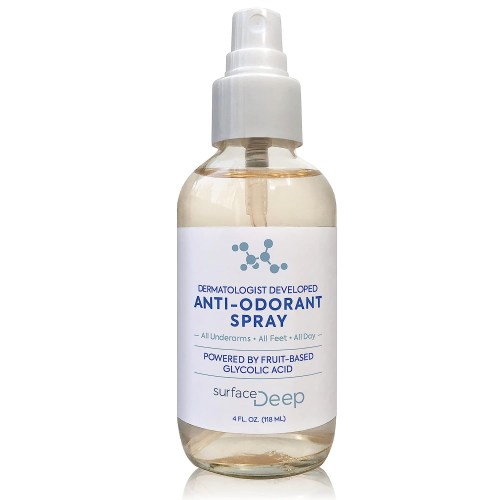
Surface Deep, Anti-Odorant Spray — $18.00
Created by Dr. Zalka, this spray blends glycolic acid with lactobacillus ferment, a soothing postbiotic. “Probiotics are live. You can’t really put a live product into a bottle that sits on your sink because, unless it’s refrigerated, those live organisms are going to perish,” she says. It also has a light dash of eucalyptus to add a gentle fragrance.
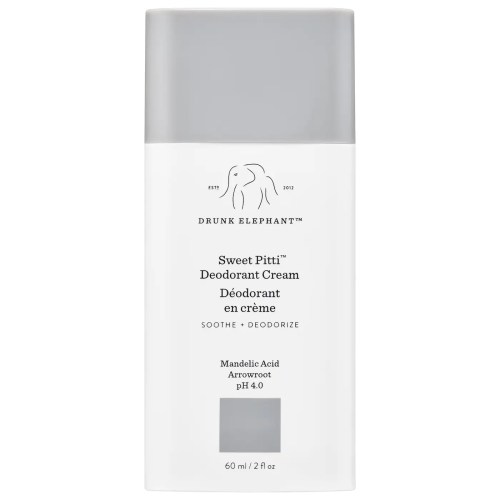
Drunk Elephant, Sweet Pitti Deodorant Cream — $16.00
This acidic deodorant uses mandalic acid, an AHA that’s gentler than glycolic acid thanks to a larger molecule size (which can’t penetrate the skin as deeply), to kill off odor-causing bacteria while arrowroot powder absorbs sweat and shea butter moisturizes and soothes.
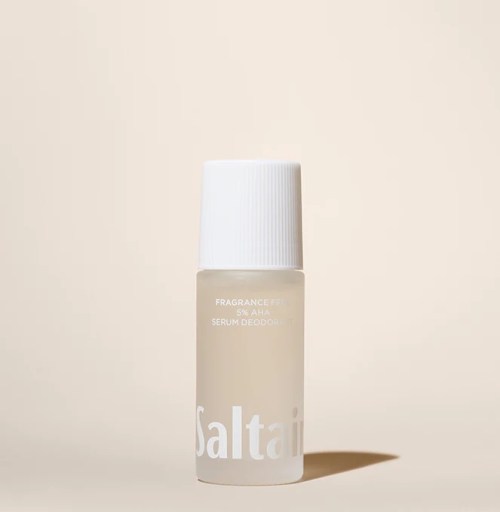
Saltair, Fagrance Free AHA Serum Deodorant — $12.00
AHA’s mandelic and lactic acids come together with gluconolactone, a polyhydroxy acid (PHA), to combat odor while brightening the look of discoloration and reducing ingrown hairs. The formula also includes niacinamide to soothe and xylitol esters to reduce skin adhesion of odor-causing bacteria.

Nécessaire, The Deodorant Gel — $15.00
This gel deodorant uses AHAs lactic and mandalic acids to combat odor, fade discoloration, and smooth bumps. It also uses niacinamide and chamomile to strengthen the skin barrier while soothing and comforting the skin.
4. Put on your deodorant
Once these step are done, your pits are prepped and ready to take on the day—but of course, you need a good deodorant.
While “deodorant” and “antiperspirant” are often used interchangeably, they happen to work in significantly different ways. The “best” option is always going to be the one that works for you, but there are a few things worth knowing as you search for your perfect pit-friendly match.
For their part, deodorants help with masking odor by coating your pits in some sort of fragrance—they don’t do much to actually stop the sweating. Antiperspirants, on the other hand, are made with ingredients (primarily aluminum salts) that “plug up the sweat glands to directly block the release of sweat, thereby reducing wetness,” explains Marisa Garshick, a board-certified dermatologist based in New York City.
There are countless different options in each category in a range of formats (creams, sticks, sprays, roller balls—the list goes on), so it’s all about finding one that stands up to your body’s unique needs… and that you actually enjoy putting on every day. Shop for some of our favorites here.
How to get rid of armpit odor permanently
By washing your armpits properly and integrating other smell-unfriendly practices into your routine, you *should* find that you’re able to remove armpit odor permanently. Keep in mind that it may require some trial and error—you may need to try a few different deodorants until you find one that works for you, and you’ll likely have to experiment with how often you’re giving your underarms a glycolic treatment—but over time, these tips and tricks should help you get the situation under control.
When to see a doctor
Most of the time, smelling a little stinky is nothing to worry about. But if none of the above tweaks are helping, it may be time to see a doctor—especially considering that in some cases, body odor can signify something more serious about your health.
“Several genetic and acquired disorders of carbohydrate, amino acid, and fatty acid metabolism are characterized by distinctive body odors,” says Chris Callewaert (a.k.a. Dr. Armpit). “In addition, several dermatological diseases can lead to an overgrowth of bacteria on the skin, which can lead to malodors.” The most common concerns include a severe form of diabetes (called diabetic ketoacidocis), “sweaty feet syndrome” (a protein processing disorder), ulcerating skin cancers, or bacteria-causing pitted keratolysis.
People also ask
How do I stop my armpits from smelling?
Sweat, on its own, is odorless—it only starts to smell when it comes into contact with bacteria on your skin. With that in mind, the most effective way to stop armpits from smelling is to cut it off at the source by killing the bacteria in the area. Proper pit hygiene that includes a good wash routine, a regular acid treatment, and an effective deodorant should do the trick. If not, dietary and lifestyle tweaks like abstaining from alcohol, drinking *tons* of water (and sweating it out on the reg), and limiting stress can also help.
Why do my armpits smell so bad even with deodorant?
You’re likely using the wrong product and/or you’ve still got bacteria under there. If you’ve tried all the antibacterial hacks listed above and still find that you smell, you may want to try another D.O. Remember: Deodorant will cover body odor, but an antiperspirant will reduce sweat overall. If you’ve tried everything—including the lifestyle and dietary tweaks—and nothing seems to help, check in with your doctor to see if something else may be going on.
What naturally kills underarm odor?
Any natural antibacterial will help kill the odor-causing bacteria in your underarm area. A few options you likely already have at home? Lemon juice, witch hazel, apple cider vinegar, tea tree oil, and baking soda.

